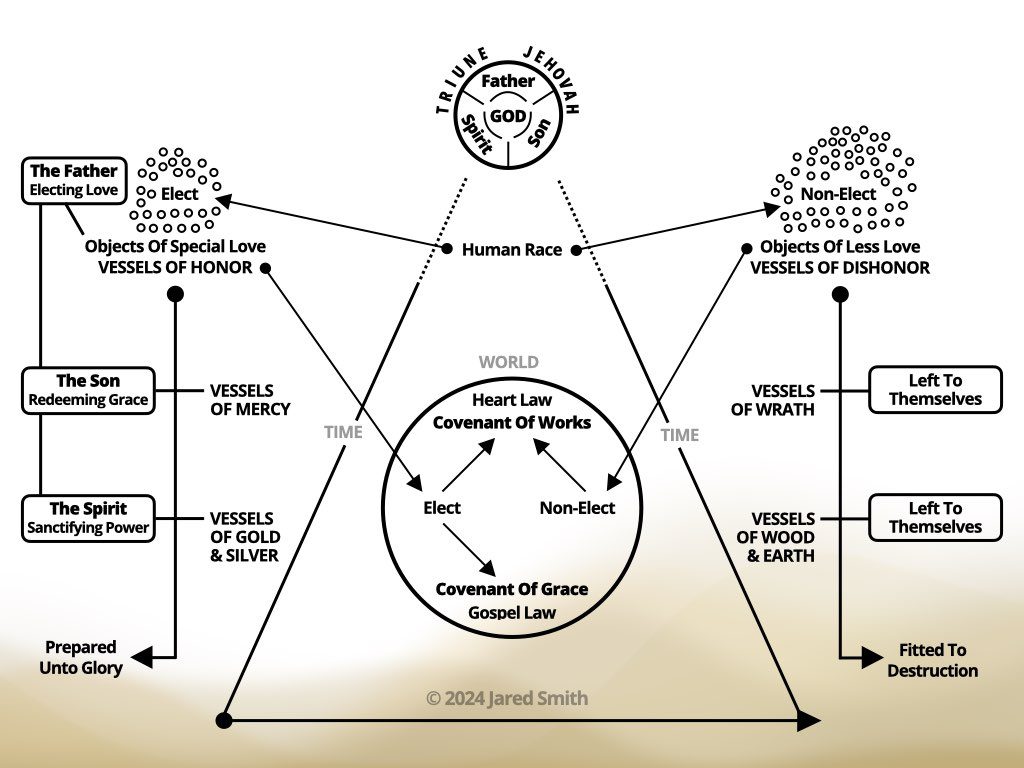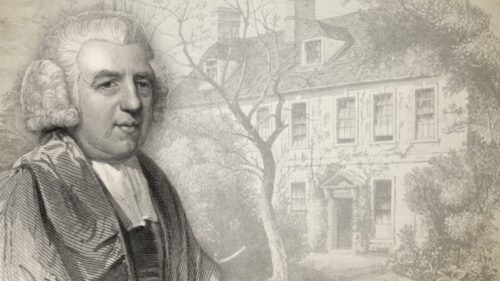Christ Is My All
[An automated transcript of the teaching video]
The Apostle Paul instructed the believers at Colosse to teach and admonish one another in psalms, hymns and spiritual songs. That’s what I hope to do by explaining the meaning of this hymn—Christ Is My All. I’d like to give an explanation of the hymn against the backdrop of the Framework of Sovereign Grace, which is God’s master plan for the ages.

You’ll notice the author of the hymn was John Adams. This was an 18th and 19th century Particular Baptist believer and businessman. Although he was not a gospel preacher, he did become a hymn writer. He was converted under the gospel ministry of John C. Ryland. This was a Hyper-Calvinist Particular Baptist preacher and when Ryland resigned the pastorate, it was handed over to his son to become the new pastor. Ryland Jr. became a friend and a follower of the teachings of Andrew Fuller, and he attempted to change the church, to conform to those views. John Adams stood against those changes and a conflict broke out between himself and Ryland Jr. And, such was the antipathy of Ryland Jr. against John Adams, that he had not only John Adams excommunicated from the church, but he destroyed the man’s reputation in the town. John Adams was forced to flee that place and he became a member of the church under William Huntington. And that’s a little background of the man who gave to us this beautiful hymn.
I’d like to read for you the stanzas of the hymn, beginning with the first:
1 Christ is my All, my sure Defense,
Nor shall my soul depart from thence;
He is my Rock, my Refuge too,
In spite of all my foes can do.
2 Christ is my All, and He will lead,
My soul in pastures green to feed;
’Tis He supplies my every want,
And will all needful blessings grant.
3 Christ is my All! where should I go?
Without Him I can nothing do.
Helpless and weak, a sinner great,
Yet in His righteousness complete.
The hymn is all about the Christian life, and therefore falls under the third branch of the gospel—the sanctifying power of the Holy Spirit. The sanctifying power of the Holy Spirit begins when the Holy Spirit conquers the soul of the sinner, uniting that soul with the Lord Jesus Christ, and then communicating to the soul the life and graces of Christ, among which would be things such as joy, peace, longsuffering, meekness and faith.
Now, this spiritual union between the soul and Christ is often identified in the New Testament as a new nature—a new nature that is created in righteousness and true holiness. And it’s within this capacity of the new nature (the soul’s union with Christ) that Christ becomes the regenerate sinner’s ALL, and that is the subject of this hymn.
However, there are many regenerate sinners who have misstepped in their walk with God, falsely believing that Christ is not enough—not enough for them. Christ is not their all. Sure, He’s something to them, but He’s not everything to them. They believe He was something to them when they were converted to Christ, but now that they walk with God as regenerate sinners, they look to other things that may support and supplement the work of Christ. He was enough for them before their conversion, but Christ is not enough for them after conversion.
One such thing that’s very popular today is the keeping of the Ten Commandments. You’ll hear it said from many pulpits that if you are to maintain your favor with God as a Christian and progress in holiness with the Lord, then you must be obedient to the Ten Commandments. These preachers will tell you that the Ten Commandments are given to you by God in order to guide your steps and enable you to live a holy life. But, my dear friends, that is Satan’s lie! I’d like to take just a couple of moments and give four reasons why the Ten Commandments are not the rule of conduct for the believer’s life, and, if you be a believer, the Ten Commandments are not a rule of conduct for your life.
The first reason is this, the Ten Commandments belonged to the Mosaic Covenant and were given to the Jewish people as a nation. Moses ministered during a time in history, at this point (pointing to the onscreen notes). And God gave to him a covenant on behalf of the Jewish people as a nation. And one of the laws of that covenant was the Ten Commandments, and it was given specifically to the Jewish people as a nation. No other people have ever been under the authority of the Mosaic Covenant and the Ten Commandments have never been the rule by which any other people on earth have been required to walk with God. It was a specific group of commandments given to the Jewish people when they existed as a nation.
The second reason the Ten Commandments are not a rule of conduct for the believer’s life. That law, which was binding upon you before you were born again, is the heart law, not the Ten Commandments. The heart law is a twofold law—first, to love God supremely; and second, to love your neighbor as yourself. Now of course, the Ten Commandments for the Jewish people as a nation were based on the heart law. The first four of the Ten Commandments are based on loving God supremely; the last six of the Ten Commandments are based on loving your neighbor as yourself. But you see, the Ten Commandments were a special application of this law to Jewish people as a nation. These specific commandments have not been given to you, a believer in Christ, nor were they given to you before you were born again. That law which governed your heart before you were born again, was basically to love God supremely and your neighbor as yourself, which is applicable in innumerable instances with applications that can’t be counted.
A third reason why you’re not under the Ten Commandments as a rule of conduct for your life as a believer. Please listen, once the sinner is born again, he or she is delivered from the authority of the covenant of works and is therefore no longer subject to its law. Every covenant has its own law. The Mosaic Covenant had the Ten Commandments as part of its law; the covenant of works, under which the entire human race is accountable to God (both Jews and Gentiles) throughout history, its law was the heart law; and, who’s ever under that particular covenant is governed by those particular laws. Well listen, when you were born again, you were delivered from the covenant of works (from its authority and from the heart law) and you were brought under the authority of the covenant of grace, which has its own law, the gospel law. And it is now the gospel law that is the rule of conduct for your life as a believer.
Which brings me to the fourth and final reason I’ll give to you. The gospel law is Christ—He it is who perfectly obeyed the heart law. See, when Christ came into the world; when the Son of God assumed a human nature, in the person Lord Jesus Christ; Christ came under the covenant of works and that law was inscribed upon His heart. And Christ perfectly obeyed that law for His elect people. And, when we’re born again, the believer now rests entirely upon the obedience of Christ to that law and therefore we are complete according to the obedience of Christ to the heart law.
Henceforth, to live the Christian life does not mean you must supplement the obedience of Christ to this law with your own obedience, either to that law or to the Ten commandments. That is why it’s a lie of Satan. If you attempt, by your obedience to keep that law, or this law, in addition to Christ’s obedience, who has kept this law for you, then you’re usurping the righteousness of Christ in place of your own. To live the Christian life simply means you live upon Christ and you stand complete in His righteousness. And when you sin, you don’t attempt to regain favor with God by doing good things, but you go to Christ and you trust His righteousness, His obedience, as your only basis of favor with God. And you walk in the obedience of Christ unto good works.
So, that’s the basic background to this hymn. I’d like to now take the stanzas of the hymn and read them in light of the Framework of Sovereign Grace.
Stanza 1
“Christ is my All, my sure Defense,
Nor shall my soul depart from thence;
He is my Rock, my Refuge too,
In spite of all my foes can do.”
This stanza’s all is about our enemies, our foes. As a believer in Christ, I need protection from my enemies. And there are many foes or enemies against which the believer in Christ must contend. Satan and his demonic host are enemies. The spirit of this world is an enemy. The ungodly who fill this world are enemies. The flesh, the old nature, the sin and corruption of our hearts, are enemies. The effects of that sin is an enemy—I mean, the relational conflicts we experience is the result of sin; the mental and emotional and physical and spiritual ailments that we experience are all the result of sin. These are all enemies, my dear friend. And, the question therefore answered by this stanza is this—What is our defense against all these enemies? And the answer is Christ. Christ is my ALL. He’s my sure defense. He’s my rock. You know the nature of a rock—you stand on it, you get on top of a rock and that is what enables you to gain perspective; getting higher up and seeing the things around you from a higher perspective. But Christ is also your refuge. You can hide under Him and find protection. So, not only does Christ give you perspective, but He gives you protection and He is your sure defense. Death is an enemy. And yea, though we walk through the valley of the shadow of death, we will fear no evil. For Christ is with us. He’s our chief and good shepherd. His rod and His staff, they comfort us. So, as a believer in Christ, I need protection and Christ is my ALL. He protects me from all enemies.
Stanza 2
“Christ is my All, and He will lead,
My soul in pastures green to feed;
’Tis He supplies my every want,
And will all needful blessings grant.”
Listen, as a believer in Christ, I need not only protection from my enemies, which the first stanza speaks about, but I need guidance for my journey in this world, which is what the second stanza speaks about. You realize my friend, there is a secret on receiving from the Lord an answer to all your desires. That’s right! There is a secret. If you follow the secret, you can have every desire from God, you ask of Him. And here’s the secret—delight yourself in the Lord. You see, when you delight yourself in the Lord, your desires will be conformed to His will and you’ll therefore never ask amiss. When making your petitions known unto God, He will forthwith not only supply all your needed blessings, but He will also give to you every want. Both of them (needs and wants) will be supplied to you, because my dear friend, by delighting yourself in the Lord, your desires will be His desires. Your will will be conformed to His will. What you need, He wants you to have; what you want, He wants you to have.
He’ll lead you in green pastures, your soul to feed—that is, whatever your circumstances may be, however blessed or burdened, at any given time of your life, you’ll have before you the green pastures of the gospel upon which to feast and edify your soul. He will lead you. We need Christ not only to protect us from our enemies, but to guide us in our journey through this world. Which leads us to the third stanza.
Stanza 3
“Christ is my All! where should I go?
Without Him I can nothing do.
Helpless and weak, a sinner great,
Yet in His righteousness complete.”
As a believer in Christ, I need not only protection from my enemies as highlighted in the first stanza; and guidance for my journey as highlighted in the second stanza; but I also need a lifeline to my soul. A lifeline! You realize, the branch without its union to the vine cannot live, so the sinner without his or her union with Christ cannot live. That’s the meaning of this last stanza. Christ is the believer’s lifeline. Without Him I can nothing.
Do you remember the words of the Lord Jesus—He said, I am the vine, ye are the branches, without Me, ye can do nothing. That’s the words of this hymn. Without Him, you can do nothing. That means, so long as you’re united to Christ, you have that spiritual union, the Spirit of God communicating the graces of Christ to your soul, the life of Christ to your soul. That’s your lifeline. Christ is your ALL.
Now, I have to highlight for you the false interpretation that’s given to this idea by many false professors of the faith. I live in the Philippines and it’s quite common when visiting a coffee shop to find the words of Paul from Philippians chapter four—I can do all things through Christ, which strengtheneth me. And, I have visited several churches in this country who teach on that passage. And what they mean by it is this—to do all things through Christ, which strengthens me, is viewed as some type of self-help lucky charm; the type of thing you’ll find in a fortune cookie; the magical spell that’s going to bring success to your life. You can accomplish all your studies and get high marks and a college degree, when Christ strengthens you! They’ll say, you can be a good father and a good mother, a good parent, if Christ strengthens you! You can go to work and you can ascend the corporate ladder and be promoted and be successful so long as Christ strengthens you! Do you see what they’re doing? They’re taking the words of Scripture and they’re applying them in a very worldly and earthly context, which was never the intended meaning by Christ and His apostles.
What then is the meaning of that expression by Paul—I can do all things through Christ, which strengtheneth me. It’s the same meaning that John Adams is driving at in the third stanza of this hymn; it’s the same meaning that Christ was driving at when He said in John 15, I’m the vine, you’re the branches, without Me, you can do nothing. It has to do with our heavenly and spiritual union with Christ, the soul’s union with Christ. And, so long as my soul is united with Christ, the Spirit communicating Christ to my soul, then I can do all things! Christ is my righteousness; He’s my sanctification; He’s my wisdom. He’s my ALL in all.
And, my dear friend, I therefore ask you the challenging question, if you’ve been born again, can you truly say Christ is your ALL? Is He everything to you? Is He your righteousness? All your righteousness? Is He your obedience to the law? All of your obedience? Is He your sanctification? Is He your wisdom? Is He your love? Is He your faith? Is He your joy? Is He your ALL? That’s the challenge of this hymn. Christ is my ALL! Where else would I go without Christ? Nothing I can do. Helpless and weak, a sinner great; yet in Christ’s righteousness, complete!
That’s the beautiful hymn written by John Adams. And now, if the testimony is true of your experience—Christ is your ALL—let’s sing the words of the hymn to the glory of God and the edification and encouragement of our souls!
Jared Smith served twenty years as pastor of a Strict and Particular Baptist church in Kensington (London, England). He now serves as an Evangelist in the Philippines, preaching the gospel, organizing churches and training gospel preachers.
Jared Smith's Online Worship Services
Jared Smith's Sermons
Jared Smith on the Gospel Message
Jared Smith on the Biblical Covenants
Jared Smith on the Gospel Law
Jared Smith on Bible Doctrine
Jared Smith on Bible Reading
Jared Smith's Hymn Studies
Jared Smith on Eldership
Jared Smith's Studies In Genesis
Jared Smith's Studies in Romans
Jared Smith on Various Issues
Jared Smith, Covenant Baptist Church, Philippines
Jared Smith's Maternal Ancestry (Complete)






